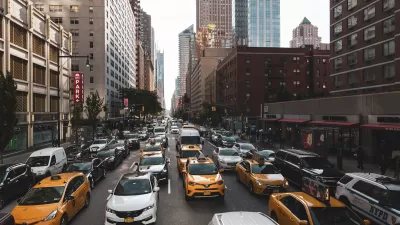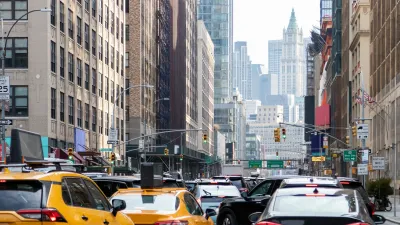New York City’s congestion pricing program, suspended by Governor Hochul earlier this year, would have pumped $12 billion into local projects and jobs.

Companies in the tri-state region surrounding New York City will lose about $12 billion in MTA contracts and 100,000 jobs due to Governor Hochul’s suspension of New York City’s congestion pricing program, a new analysis reveals.
As Gersh Kuntzman points out in an article for Streetsblog NYC, roughly $12 billion in capital investments that would have been funded through congestion pricing revenue was set to pay for contracts with private-sector companies throughout the region. “Those companies have done well, and provided thousands of well-paying jobs, in the prior decade of MTA capital expenditures, and would likely have tapped into the 2020-24 capital plan that was partly funded by congestion pricing, but is now being slashed.”
Paradoxically, “Many of the biggest recipients of MTA contracts over the past decades are in districts represented by avowed congestion pricing opponents.” A senior policy advisor for Reinvent Albany, the group that conducted the analysis, “was surprised that so many lawmakers object to a plan to fund MTA capital improvements that end up benefitting so many of their constituents and local businesses.”
FULL STORY: Hochul’s Congestion Pricing ‘Pause’ Will Cost Area Companies Billions

Alabama: Trump Terminates Settlements for Black Communities Harmed By Raw Sewage
Trump deemed the landmark civil rights agreement “illegal DEI and environmental justice policy.”

Planetizen Federal Action Tracker
A weekly monitor of how Trump’s orders and actions are impacting planners and planning in America.

How Atlanta Built 7,000 Housing Units in 3 Years
The city’s comprehensive, neighborhood-focused housing strategy focuses on identifying properties and land that can be repurposed for housing and encouraging development in underserved neighborhoods.

In Both Crashes and Crime, Public Transportation is Far Safer than Driving
Contrary to popular assumptions, public transportation has far lower crash and crime rates than automobile travel. For safer communities, improve and encourage transit travel.

Report: Zoning Reforms Should Complement Nashville’s Ambitious Transit Plan
Without reform, restrictive zoning codes will limit the impact of the city’s planned transit expansion and could exclude some of the residents who depend on transit the most.

Judge Orders Release of Frozen IRA, IIJA Funding
The decision is a victory for environmental groups who charged that freezing funds for critical infrastructure and disaster response programs caused “real and irreparable harm” to communities.
Urban Design for Planners 1: Software Tools
This six-course series explores essential urban design concepts using open source software and equips planners with the tools they need to participate fully in the urban design process.
Planning for Universal Design
Learn the tools for implementing Universal Design in planning regulations.
Caltrans
Smith Gee Studio
Institute for Housing and Urban Development Studies (IHS)
City of Grandview
Harvard GSD Executive Education
Toledo-Lucas County Plan Commissions
Salt Lake City
NYU Wagner Graduate School of Public Service





























